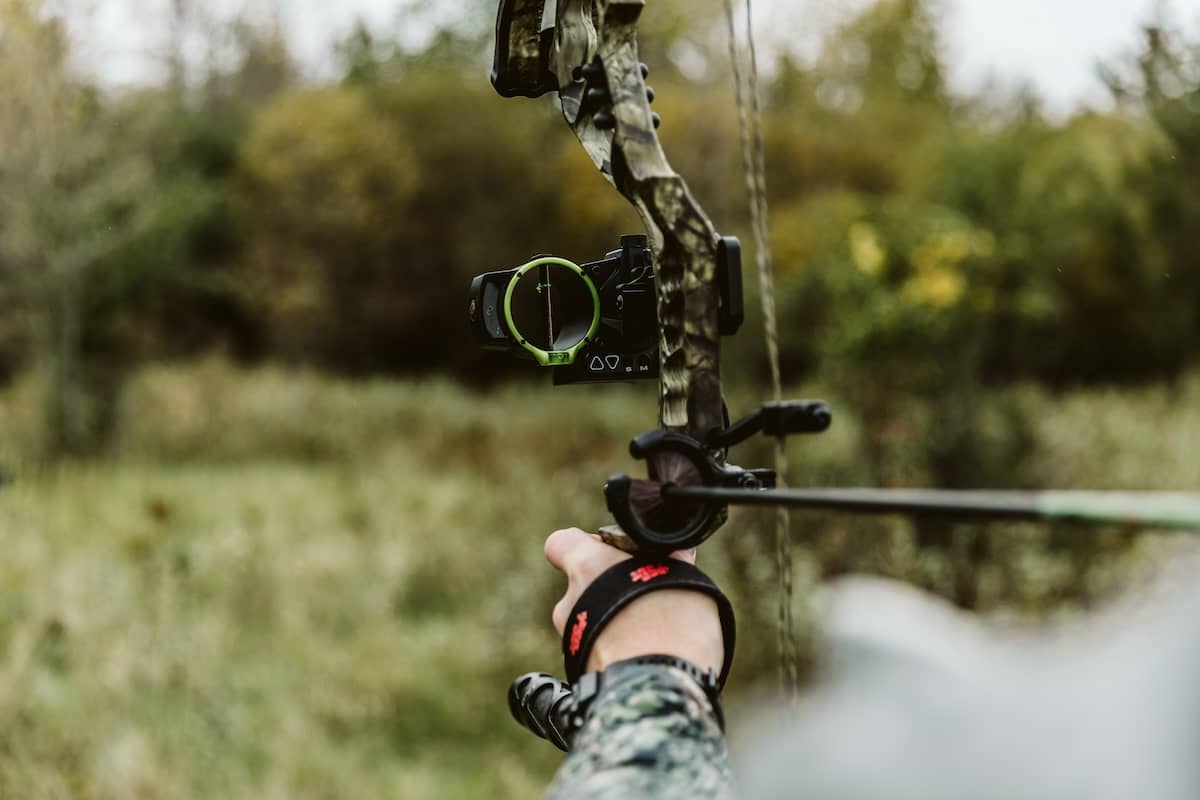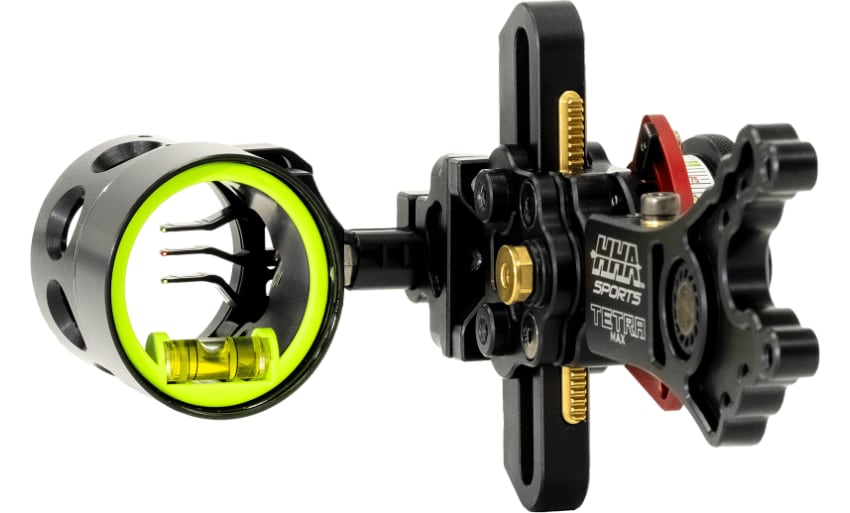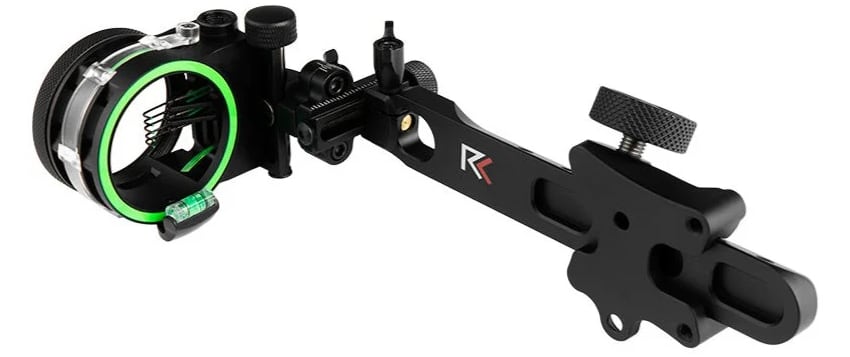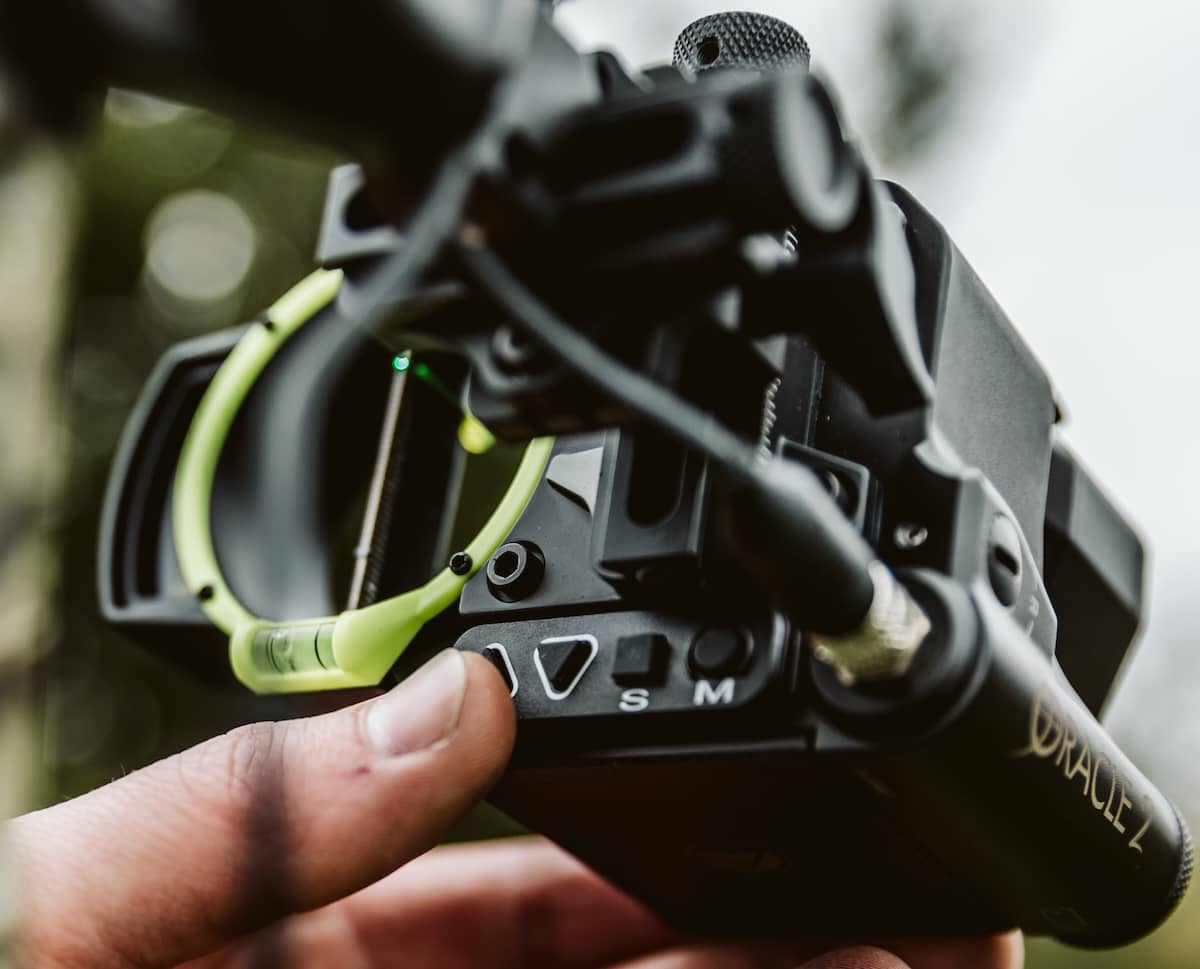Adam Scepaniak 08.20.24

You need a bow sight for your beginner compound bow or hunting bow. You can’t hit what you can’t see.
I’ve had experience with every type of bow sight, from arrowing carp with a bit of “Kentucky windage” — no sights at all — while fighting the refraction of brackish water as a child. As an adolescent, I leveled up to a single pin sight on a recurve bow — where I still had to optimistically shoot into the sky in hopes of hitting a 40 yard bale target.
Having not yet dissuaded my father from taking a bow out of my hands, he rewarded me with a 5-pin sight and a compound bow to match. My feeble arms on my young frame trembled to pull back the 60-lbs draw weight, but I enjoyed launching arrows at 60-yard McKenzie targets. As an adult, I found myself reviewing futuristic tech like the Burris Oracle 2 that employs touchpads, sensors, and can plot the optimal path for the trajectory of your arrow.
I have seen and handled it all, and one thing I can tell you is, no matter how much you spend on a bow sight: You can’t hit what you can’t see. What makes a good bow sight in 2024 and beyond?
The Best Bow Sight: HHA Sports Tetra Max RYZ X3
The HHA Sports Tetra Max RYZ X3 ($469.99 MSRP) lands our number one spot for best bow sights for 2025. This bow sight encapsulates all of the modern tech you’d wish to see in a bow sight without being too over-the-top or expensive.

- Micro and macro windage adjustments plus infinite elevation adjustment
- Fixed frame, picatinny Mount, and 2 dovetail mounting options
- Bright, vibrant fiber optics
- Bubble level
The HHA Sports Tetra Max RYZ X3 is American made and backed by a lifetime warranty. While no one plans to take a tumble out of a tree or down a hill – it’s equally reassuring that they have your back (and your sight) covered.
The Best Budget Bow Sight: Redline RL-3 Dovetail
The Redline Bowhunting RL-3 Dovetail bow sight is so cheap that you may question if it’s any good, but the build quality is there and it flatly performs — no frills necessary. Typical retail is $100, but Redline has dropped it down to $59.99, making it ultra-affordable for the economically-minded hunters among us.

- 0.019” fiber optic pins & enclosed fiber optic ring
- Tool-free locking adjustment knob
- Precise micro-adjustment windage and elevation
- 3 mounting points, bubble level, and rheostat light included
The Redline RL-3 Dovetail bow sight comes in either a 3-pin or 5-pin sight offering, and is fairly light at only 9.5 ounces. Redline Bowhunting is an American company with origins in Ohio and Pennsylvania, but they do source products and components globally. This explains a bit how they achieved a startlingly affordable sight that still retains quality and simplicity.
What do the pins on a bow sight mean?
The pins on a bow sight are a representation of a given distance you want to shoot. Similar to a rifle’s scope and its associated reticle, your bow’s pins are your reticle. Each pin is a given yardage or distance for you to aim and shoot. A logical progression for most people is a 20-yard and closer pin, then a 30-yard pin, next a 40-yard pin, etc, depending on how many pins you desire.
Is a single-pin or multi-pin bow sight better?
A single-pin or multi-pin sight can benefit you in different ways whether you are a new archer, old, a hunter, competitor, or otherwise. Let’s look at the pros and cons, but most people are best-served by a simpler single-pin sight.
Pros
A single pin sight is simple. The sight picture is not busy, there is nothing to confuse yourself, and they are inherently more reliable because there are fewer “pieces to the puzzle.” Once you confirm your zero at a desired distance and it is torqued tight, you are set. Done. Good to go.
With a multi-pin sight, whether you are a competitive archer or a hunter, you can quickly engage targets at varying distances with confidence because you have multiple confirmed zeroes. Additionally, there is no need for some of that “Kentucky windage” we mentioned before. You have confident target engagement at lots of distances.
Cons
With a single pin sight, you’re limited. Whether you set that singular pin to be a 20-yard, 30-yard, or 40-yard distance, you are stuck with that distance. Then, you are arbitrarily adjusting in space where you think you should aim when you are not shooting the distance of the pin. This becomes an art over time that requires hours of practice, but for most, it is not a gamble worth making on a deer or other wild game.
With a multi-pin sight, there is a greater chance that individual pins drift, move, or simply become “not sighted-in” anymore. You have more moving parts which opens the door for things to go wrong. Also, when you are aiming, it can be a very “busy” sight picture. Am I shooting 30 yards? Was that my 3rd or 2nd pin, again? Goll, dang it!
How many pins should I have on my bow?
I would suggest a single pin sight for the vast majority of archers. The simplicity makes life easy, there are less components to zero and maintain, you have a less busy sight picture, and you can focus more on your target. Multi-pin sights are considered more advanced and are simply more work.
Types of Bow Sights
Long gone are the days when we only had one option for the type of sight we could deploy in the field. Now, there are several categories of sights to choose from, let alone dozens of quality options in each. The four most common you will encounter are adjustable pin, digital, fixed pin, and hybrid sights.
Fixed Pin Sights
Fixed pin sights are the ol’ bread ‘n butter. You have a single or multi-pin sight system that is adjustable, but once you sight-in this specific sight (likely to a given grain weight arrow and broadhead/field tip combination), then you will tighten down the pins so they are fixed in place. This narrows down the arrows and tips you might deploy for target shooting and hunting, but it is typically renowned for being solid and reliable.
Adjustable Pin Sights
For starters, what is a pin, and additionally, what is an adjustable pin sight? A pin is a definitive reference point for aiming your bow. Similar to the bead on a shotgun or the center of a crosshair in a scope. An adjustable pin sight is one that you can adjust for windage and elevation. Essentially, having the ability to zero it to your needs.
There are two types of adjustable pin sights on the market. One is meant to have the pins adjusted to different arrow configurations. These varying combinations can have a large difference in overall weight requiring different aiming points on your pin sight; thus, an adjustable pin sight.
The second style is something newer and likely took a nod from fall-away arrow rests. There are bow sight manufacturers now crafting sights that can have multi-pin sights drop away some of their pins while you’re shooting. Either by manually folding them to the side, or some models will have them drop out of the way.
Digital Sights
Digital sights use technologies like that found in a laser rangefinder (LRF) to range your target, display an aiming point based upon the yardage you are shooting, and often have other on-board statistics like the temperature, date, time, a built-in level, and other high-tech elements.

Hybrid Sights
Hybrid sighting systems incorporate multiple technologies from these previous 3 categories. They can still be niche because of the unique blending of attributes and properties as well as how you might want to deploy a sight like this in the field. For example, you could have a fixed pin sight that still has a laser rangefinder (LRF) built into it for its ability to range objects.
Factors to Consider When Choosing Bow Sights
So, when you are looking to purchase a bow sight, what should you be looking for or considering? The elements that you may want are going to boil down to several factors and it all depends on how important each specifically is to you.
- Accuracy: Are you looking to do target archery, or simply need a serviceable hunting sight?
- Ease of adjustment: Do you require something with a large range of adjustment (to shoot 10 to 100 yards), or will a more fixed platform serve you well (you shoot intermediate distances of 10 to 40 yards)?
- Durability: How rugged will you need your sight to be?
- Price range: What is a realistic budget for you? How much are you willing to spend?
Other things you will want to note are:
- How the sight attaches to your specific bow.
- Do you require a picatinny mount, a rail, or something more niche?
- Do you want to dip your toes into electronic sights?
- If so, are they even legal for hunting and/or competition where you live?
These are all important questions to ask yourself throughout your purchasing process.
As you can see, there are a lot of quality options on the market today for bow sights that can run the gamut from the glamorous to ho-hum. You simply need to decide what is most important for you. Do you have a tight budget for yourself? Are you in need of one that is “bulletproof” and could fall down the side of a mountain? Or, is adjustability and accuracy more important to you in your needs? The 4 aforementioned factors are a simple yet valuable guide to how you may want to shop for a bow sight: accuracy, adjustment, durability, and price.
Latest Trends in Bow Sights for 2024
Manufacturers are always looking to up the ante when it comes to bow sights. One recent breakthrough is the combination of a sight and a rangefinder into a package small enough to attach to a compound bow.
Material improvements are slow to come, but borrowing popular ideas and themes from other industries has panned out to be useful for archers. We still see a lot of 6061 aluminum housings being used as it is relatively cheap for manufacturers, yet durable enough to hold up out in the field. Additionally, fiber optic sight pins are still the gold standard sighting design regardless of how it is presented.
Hardcoat anodize finishes are common, but we are starting to see Cerakote finishes creep into the archery industry as well. Cerakote finishes are popular in the firearm market and widely used in industry. Picatinny mounts — like those often seen on AR-15s — are becoming semi-commonplace with bows, too, allowing for easy attachment of accessories.
Bubble levels are becoming more common in bow sights as well. So, even if your archery friends would never call you “level-headed,” at least you can still remain square with the world when you deliver your shot.
Runner-Up Bow Sights for 2024
This is a list of quality bow sights that may fit your individual needs better than our top picks.
Trophy Ridge SWFT — $219.99
The Trophy Ridge SWFT bow sight is the second most affordable sight on our list and it is still a feature-rich choice for anyone in need of a new bow sight. Trophy Ridge deploys a magnesium and aluminum construction for longevity and durability, and they tout superb accuracy with their single-pin design out to 100 yards.
- Tool-less micro adjustments: Effortlessly fine-tune your shots with tool-less micro click adjustments
- Adaptable click light: Adapt to various lighting conditions using the adaptable click light feature
A single-pin bow sight limits what you can do with it, but for some archers, “less is more.” They would rather have a single-pin sight than a busy one with a bunch of distracting pins. If you happen to fall into that camp then this bow sight is for you.
Spot Hogg Fast Eddie PM — $329.99
The Spot Hogg Fast Eddie is an expansive suite of bow sights for varying uses that are very popular among target archers and hunters alike, but the Spot Hogg Fast Eddie PM (Picatinny Mount) specifically commands our #2 position in this list.
- Right-hand & left-hand options
- Multiple fiber optic pin dIameters: 0.010” | 0.019” | 0.029”
- Fiber optic pin colors: Green | Yellow | Red
- Pin options: Single, Double, Triple Stack, 3-Pin, 5-Pin, 7-Pin
With MSRPs starting at $329.99 and running up to $449.99, archers can choose as elaborate or simple a bow sight as they desire. The quality construction of this sight should make it endure for the long haul with 6061 aluminum and a Type II anodized coat finish plus it is an authentic American made product.
Black Gold Mountain Lite Dual Trac — $339.99
The Black Gold Mountain Lite Dual Trac scores well on our list because of its ruggedness, price point, and feathery weight. Tipping the scale at only 8.7 ounces, this is the lightest bow sight on our list and affords you the durability you need when your truck and cell service are nowhere in sight.
- The perfect combination of single-pin visibility with the addition of a 2nd independently adjustable Pro Pin for increased speed in aiming.
- 0.019” Pro Pins have a narrower pin throat that ends in a perfectly matched round pinhead that allows for less target blackout.
- The ML base is more compact and super lightweight. Perfect for maneuverability in the tightest conditions.
- The high-performance PhotoChromatic shell adapts pin brightness to all light conditions for perfect pin clarity.
With 3 dimensions of adjustability — 1st and 3rd micro-adjustable axis with 2nd non-micro adjustable axis — you can fine-tune this sight to be accurate for you whether you are shooting uphill, downhill, or other extreme angle situations.
CBE Trek Pro Micro 3V — $349.99
The Custom Bow Equipment (CBE) Trek Pro Micro 3V is a continuation of their ever-popular Trek 2V and Trek Pro 2V bow sights that ups the ante even more for desirable tech. Being moderately light at 9.8 ounces, the newest features boasted for the Trek Pro Micro 3V are 3 vertical pins with micro adjustable top and bottom pins (middle one fixed), and you can set up 2 of those vertical pins with dual indicator pointers.
- Lightweight design featuring a carbon fiber extension dovetail sight bar with numerous positioning options
- 12” of fiber optic management system for better protection & even brighter pins
- Machined aluminum construction for added durability
- Hybrid elevation adjustment with dead stop for top pin
- Micro windage adjustment with laser engraved marks & micro blade pin system
This bow sight allows you to choose your Handedness and Pin Sight size (0.01” or 0.019”) as well as the ability to add a lens, sunshade, and rheostat cover so you can manipulate exactly how bright you want your fiber optic pins to be.
Burris Oracle 2 — $399.99
The Burris Oracle 2 is a laser rangefinding bow sight that has been out for a few years now, but it remains a good buy when it comes to electronic bow sights as the price has become more affordable over time. At $399.99, this is a proven electronic bow sight with tech you desire that is not overly complicated to run.
- Improved Auto-Brightness Detection
- Improved Manual Brightness Control (lower levels)
- Improved Set-Up (micro-adjustments on LRF)
- Better Waterproofing
- More accurate arrow drop calculations
This electronic bow sight is built to withstand the rigors of hunting that you’re willing to endure and can operate in temps from -20F to 140F. With a 2,000+ hour battery life and the ability to range whitetail deer out to 200 yards, this electronic bow sight is a bargain at its $399.99 price tag.
Ultraview UV Slider — $599.99
Peculiar in its design, but effective in its practice, the Ultraview Archery UV Slider locks in the #8 spot on our list of the best bow sights. The highlight feature of the UV Slider is the concentric dial architecture with zero backlash and an optimized gear ratio. You can conveniently unlock and lock both elevation and windage with strategically placed, easy-to-reach locks.
- Handedness options: Right-Hand | Left-Hand
- Mounting styles: Bridge-Lock | Picatinny | Side Mount
- QuickBreak™: Quickly break down the sight and scope unit from the vertical rail, making traveling and cleaning easy for when distant hunts get dirty.
- TripleMark™: A unified pin and indicator pairing solution that makes every pin a floating pin – guaranteeing precision at any distance. The indicator pins are ultra-fine and close to the tape for increased accuracy.
- DualDial™: Conveniently lock and unlock both elevation and windage with strategically placed, easy-to-reach locks. DualDial™ is the most user-friendly sight adjustment system on the market.
The Ultraview UV Slider tries to take a simpler approach to bow sights by having basic exterior dials to adjust and sight-in your bow as opposed to small knobs, Allen keys, and other difficult-to-handle tools.
Option Archery Canyon Pounder — $640
The Option Archery Canyon Pounder bow sight is unique because it offers a feature that no other sight on our list has in that you can go from multiple pins down to one with their patent-pending Disappearing Pins.
- Helix Drive is machined to Precise Tolerances eliminating the need for a Drive Block
- 2nd and 3rd Axis Adjustability
- Multiple Mounting Options: Standard Extension | Direct | Bridge-Lock | Pic Rail
The Option Archery Canyon Pounder is one of several bow sights on our list that is made in the USA and it also carries the Option Archery “Lifetime Bumper-to-Bumper Warranty.”
Garmin Xero A1i PRO — $1,299.99
The Garmin Xero A1i PRO offers the best-of-the-best in modern technological advances for bow sights. The few reasons why it does not score higher on this list is because of its price tag and that many states are outlawing them – perceived as too great of an advantage – for hunting.
- Auto-Ranging Digital Sight: No need to guess the distance to your target as this sight calculates it automatically
- Dual Color LED Pins: Automatically creates pin stack to the estimated maximum distance for your bow based on arrow speed, draw length, and arrow diameter
- Customizable Arrow Profiles: Xero A1i PRO saves pin settings for multiple arrow configurations, so you can change from your practice setup to your hunting setup in seconds
This bow sight touts a laser rangefinder (LRF), a dynamic/digital level, and a Laser Locate function where you can pair this sight with a separate Garmin product to GPS pin the location of when and where a shot was taken. It brings to the table a lot more than what was even mentioned as it is a viable computer for your bow out in the field.
Tips for Using Bow Sights Effectively
Maintain perspective with your sight. Most are delicate. So, you should treat them with respect and care. You can’t drag ‘em down a gravel road and be mad that something breaks
Also, don’t make adjusting them harder than it needs to be. Like a magnified scope for a crossbow or rifle, there is basic windage and elevation; move up and down, or right and left. Keep it simple. There’s no need to account for the moon phase, the Coriolis effect, or the ocean tide.
Understand the failings and “stacked tolerances” of the user – you – is important as well. You have muscle fatigue, mental cloudiness, vision impairments, and nuances in your grip; nevermind all of the stacked tolerances in the complete build of your bow. If you aren’t stacking arrows on the bullseye like Robin Hood (that’s an outlier; not the norm) that doesn’t mean the sight or bow is necessarily bad.
FAQs
What are the best bow sight brands?
Our Top 10 list of the Best Bow Sights is also a great reference for the best brands as well. We included throughout our list all of these brands:
- HHA Sports
- Spot Hogg
- Garmin
- Burris
- Custom Bow Equipment (CBE)
- Redline Bowhunting
- Black Gold
- Ultraview Archery
- Option Archery
- Trophy Ridge
What states are electronic bow sights illegal?
Electronic bow sights are illegal in a lot more states than people may realize when it comes to hunting. That’s why it is best to research which states they are, and are not, allowed before setting up an out-of-state hunt for yourself while deploying an electronic bow sight. The most recent findings for 2024 show that these are the 15 states in which it is ILLEGAL to use an electronic bow sight:
- Washington
- Oregon
- Idaho
- Montana
- North Dakota
- South Dakota
- Florida
- Rhode Island
- Wyoming
- New Jersey
- Colorado
- California
- Kansas
- Oklahoma
- Alabama
What is the best archery target sight?
One of the best competition bow sights on the market today comes from a brand we covered in our list with that being Black Gold. They make their Competition 2A that retails for $509.95 and it gives you an incredible amount of adjustment to hone in your zero with an absurd level of attention to detail.
What bow sights are made in America?
There are a lot of quality bow sights on the market today, but not that many are 100% American made. Yes, many companies source parts overseas to keep costs down and it is a common practice across all industries (not just bow sights), but if you want a truly USA made product, stick with these 3 brands off of our list: Spot Hogg, HHA Sports, and Option Archery.
Conclusion
When you’re hunting down a new bow sight for yourself, it is often best to choose a singular trait that means the most to you: price, weight, adjustment, electronic, etc. We have declared the HHA Sports Tetra Max RYZ X3 as our best bow sight, but maybe you are price conscious and that’s too much for you. Make sure to seek out and best what is best for your specific bow, needs, and particular situation. Because remember: “you can’t hit what you can’t see.”
